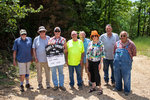From the beginning of time, men have dug in the dirt. Every once in a while, one will come along who "digs" it for real. Here, think "digs" in the 60's sense. It's meaningful, enjoyable, and …
This item is available in full to subscribers.
We have recently launched a new and improved website. To continue reading, you will need to either log into your subscriber account, or purchase a new subscription.
If you are a current print subscriber, you can set up a free website account by clicking here.
Otherwise, click here to view your options for subscribing.
Please log in to continue |
|






From the beginning of time, men have dug in the dirt. Every once in a while, one will come along who "digs" it for real. Here, think "digs" in the 60's sense. It's meaningful, enjoyable, and satisfactory. Think Jim Turner, Osage County's longest-tenured clay miner. Speaking of his firm, the Jones & Turner Clay Mining Company, Turner said, "We are the oldest continually operating clay mining company of all the clay mining operations."
Jim Turner's father, Homer Turner, and his brother-in-law, Paul Jones, founded the Jones & Turner Mining Company in 1930. Homer had just returned from California. There, he held various jobs, including mining for gold. Almost immediately, they hit on something more profitable. The firm mined fire clay, used in the manufacture of fire brick. Early on, their exclusive customer was the A.P. Green Fire Brick Company in Mexico, Mo. Jones & Turner sold clay up to the very end to HarbisonWalker International Refractory Products, Inc. That's the global conglomerate that bought out A.P. Green. They still maintain a machine shop on Green Boulevard in Mexico. In 1932, Jones was forced by ill health into retirement, becoming a silent partner.
In the 1930s, fire clay was one of the few Depression-proof industries in America. Before Homer Turner started mining it, a lot of clay was coming from central Missouri. It was used in warships built for World War II. The huge boilers were manufactured to resist heat to 3,000 degrees Fahrenheit. Jones & Turner got into that supply chain early and later sold clay to build launch pads at Cape Canaveral.
There was a local benefit and historical significance to Osage County. A worker hired in the clay mines had it better than most blue-collar Americans in the Great Depression. The labor was very arduous but it paid as well and more consistently than other similar work which a man may or may not have been able to procure. Farm labor, and even small farm ownership, was as hard, and the cash flow was much less predictable.
Early mines were located in Rosebud, Owensville, and other places in Gasconade and Osage counties. Maries, Crawford, Phelps, and Franklin counties round out the central Missouri clay district. Before the Jones & Turner days, the product came out of the ground with picks, shovels, and wheelbarrows. It was hauled by wagons and mules and the earliest flatbed trucks. The first destinations were railroad terminals in Hermann and Chamois. By the time Jones & Turner was formed, it was shoveled by crews of eight to ten men onto low-slung flatbed trucks, customized for their purpose. They then transferred onto rail cars bound for A.P. Green. It wasn't long before heavy equipment began to appear. Now, huge excavators, loaders, and bulldozers load tons at a time. They fill the largest trucks Missouri's roads will hold. More is now transported exclusively by truck and less by rail.
In recent years, the predominant product has not been fire clay. Now, demand is for clay with minerals for the manufacture of cement. According to Jim Turner, that market is increasing every year. Some of the product still goes to HarbisonWalker but several cement companies within trucking distance are customers. However, "It's still surprising how much fire clay we are selling," said Turner.
Turner remembers his father as a man very conscientious about his work. "He was extremely interested in the clay-mining business," said Turner. "He was always very good to his employees."
The business and those well-treated employees returned the good stewardship. There was prosperity for the family. Young Turner was sent to college at the University of Missouri in Columbia. There, he studied geology and languages, graduating Phi Beta Kappa. He pursued graduate studies at the University of Mexico, Mexico City, the capital of the magic and romantic land south of the border. At least, that's the reputation it maintained and it maintained it well during Turner's salad days.
"One of the funny stories he told was the time some tools were stolen from the tool shack. He must have suspected who it was because he left a note (which was probably full of expletives that he was noted for) stating that the tools had to be returned. A few days later the tools did return along with a note that said, 'I is yor man. Sory. (sic)’ Daddy never said who it was that took them because it was just a kid. Years later I found out who it was, but it shall always remain in my memory only. If Daddy would have turned him in he could have ruined the kid's life forever. He always did have soft spot for the underdog."
It's important to note that Homer Turner was not all work and no play. He was very willing to take off his boots at the end of a workday, and grab a fly rod or a shotgun. He was a fly fisherman and an avid quail hunter. Pools on the Gasconade River were full of healthy perch. The fields along it held numerous coveys of quail. Turner played both to a great deal of avocational satisfaction.
Jim Turner inherited business sense, diligence to duty, and a desire for recreation. The University of Mexico rewarded his study and enthusiasm with a legendary romance. It was there he met his wife Janet, pronounced "Jeanette," whose parents had retired to Mexico. Born in England, she was working in the British Embassy in Mexico City when the two met. They were married in 1962. Their house may be the only one in Osage County where one can hear Spanish spoken with a British accent. It's also home to a 1900 Steinway grand piano, which Turner had completely restored. Under his well-practiced hands, it will render anything from Chopin to Scott Joplin.
Jim worked part-time, especially summers, in his father's company while in college. Homer encountered ill health in 1963, passing away in 1964. It was in 1963 the cosmopolitan couple settled on the banks of the Gasconade. She became a homemaker and later developed an interest in antiques. He assumed full-time operation of Jones & Turner. They raised two sons, one now living in Columbia, and the other in Chicago, Ill. She operates The Rainbows End Antiques shop in Linn. They have moved their home to a property south of Linn, where both Turners are avid card players.
"We play a game of cribbage every day," said Turner.
Right next to the piano is a card table. It's not the folding, portable kind. It's a serious piece of antique furniture, refinished by Janet.
Turner is now retiring. When asked if the COVID year of 2020 had anything to do with his decision, Turner replied negatively.
"We didn't lose any work at all," he asserted. "I was enjoying it. I had very good people working for me."
It just seemed like the time.
As for his employees, he holds a special high regard for Harlan Wehmeyer. For 35 years, Wehmeyer was Turner's right-hand man, managing the mining operation. Like Turner, he's a second-generation clay miner.
"I could leave for weeks at a time," said Turner. "We wouldn't miss a lick."
Wehmeyer has also retired. With the current driver shortage, no company employee has had trouble finding work.
So the Jones & Turner Company is now part of a very meaningful portion of Osage County's history. However, Jim and Janet Turner are still very active and intend to accomplish a lot more. They're anxious to see what's in the cards.